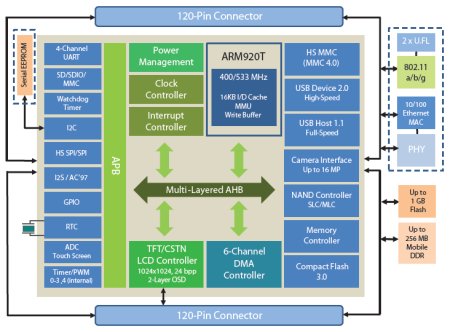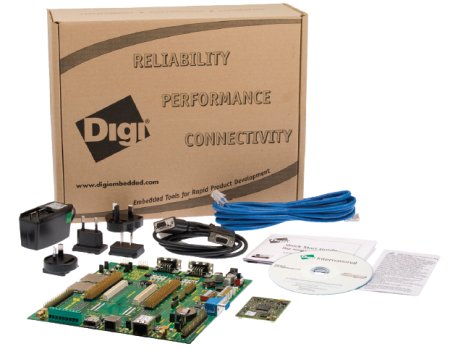ARM9 modules offer WiFi support
Mar 4, 2009 — by Eric Brown — from the LinuxDevices Archive — 8 views Digi International is readying two ARM9-based, network-enabled embedded modules that run Linux or Windows CE. Equipped with a Samsung S3C2443 SoC, the ConnectCore 9M 2443 and WiFi-enabled ConnectCore Wi-9M 2443 offer a variety of interfaces, including Ethernet, USB, serial, and camera support, says Digi.
Digi International is readying two ARM9-based, network-enabled embedded modules that run Linux or Windows CE. Equipped with a Samsung S3C2443 SoC, the ConnectCore 9M 2443 and WiFi-enabled ConnectCore Wi-9M 2443 offer a variety of interfaces, including Ethernet, USB, serial, and camera support, says Digi.
(Click for larger view of the ConnectCore 9M 2443 module)
The modules are targeted at applications such as networked displays, medical devices, building access controls, energy management devices, time and attendance devices, and scales, says Minnetonka, Minn.-based Digi. The products are the latest in a line of ConnectCore modules, including the ConnectCore 9P series, which first shipped in 2005, and which last year received a BarracudeDrive port from Real Time Logic (RTL).
The 9M 2443 modules are based on the Samsung S3C2443 ARM9 system-on-chip (SoC) and run at 400MHz or 533 MHz. Launched in 2003, the widely used S3C2440 series integrates 16KB each of instruction and data cache, 4KB RAM, a NAND flash boot loader, power management functions, an interrupt controller, and an external memory controller. The 9M 2443 series modules are supplied with 64MB to 256MB of mobile DDR, and 128MB to 1GB of NAND flash.
The ConnectCore 9M 2443 series is touted as “33 percent faster than any other ARM9-based core module.” This is apparently due to what Digi describes as a multilayered memory bus architecture, enabling simultaneous data transfer between processor, memory, and peripherals. The architecture reduces bandwidth bottlenecks, so tasks such as updating graphical information via the LCD controller and retrieving data from memory can be performed simultaneously without a performance hit, claims the company.

ConnectCore 9M 2443 block diagram
(Click to enlarge)
In addition to the aforementioned LCD controller, peripheral options include Ethernet, USB 2.0 host and device, SD memory cards, mass storage, camera, and audio codecs interfaces. In addition, the Wi-9M 2443 offers an 802.11a/b/g interface. The modules are also said to provide off-the-shelf hardware and software support for all power management modes, enabling mobile, battery-powered devices.
The ConnectCore 9M 2443 has been tested and granted the European CE mark for compliance with safety standards, and the Wi-9M 2443 model will be certified upon availability, says the company. Both modules are said to offer a five-year manufacturer's warranty.
Specifications listed for the ConnectCore 9M 2443 and ConnectCore Wi-9M 2443 include:
- Processor — Samsung S3C2443 ARM9 clocked to 400MHz or 533MHz
- Memory — 256MB mobile DDR
- Flash — up to 1GB NAND flash
- Connectors — 2 x 120-pin board-to-board connectors
- LCD controller — up to 1024×1024 resolution; up to 16 grey levels/4096 colors (STN); up to 24bpp; 2 x overlay windows (TFT)
- Networking interface — 10/100BaseT
- WiFi — 802.11a/b/g (ConnectCore Wi-9M 2443 only)
- USB interface — USB 2.0 device, 1-port, high-/full-speed; USB 1.1 host, 2-port, low-/full-speed, integrated PHYs
- Camera interface — ITU-R BT 601/656 8-bit support; 4096×4096 resolution; 2048×2048 scaling; mirror, 180-deg. rotation; digital zoom in; RGB 16/24-bit, YCbCr 4:2:0/4:2:2 output
- Other interfaces:
- SPI/HS-SPI — master and slave mode
- I2C — standard and fast mode
- SD/DIO/MMC — 1-/4-bit and block/stream, up to 25MHz
- High-Speed (HS) MMC — SD HC 1.0, SD MC 2.1, SDIO 1.0, MMC 4.2; 1-/4-/8-bit modes, up to 50MHz; CE-ATA support
- CF/ATA — Compact Flash 3.0 PC card mode; ATA/ATAPI-6 mode w/ PIO/UDMA
- UARTs — 4-channel, up to 921Kbps, IrDA 1.0 SIR mode
- GPIO — 24 external IRQs; 147 multiplexed IRQs
- Audio codec controllers — I2S and AC'97
- ADC and touchscreen interface — 10-bit, 10-channel multiplexed, 500k samples/s
- Timers/PWM — 4-ch 16-bit timer/PWM, 1-ch 16-bit internal
- 8-/16-bit external memory bus interface
- Other features — Watchdog timer, real-time clock
- Power — 3.3V; from 37 mA (sleep) to 554 mA (maximum); PoE support
- Power management modes — Normal, idle, stop, sleep, Ext IRQ, RTC alarm, tick interrupt wake-up
- Operating temperature -4 to 158 deg. F (-20 to 70 deg. C); extended model: -40 to 185 deg. F (-40 to 85 deg. C)
- Dimensions — 2.4 x 1.7 x 0.3 inches (60 x 44 x 7mm)
- Operating system — Linux 2.6 or Windows CE

Digi ConnectCore 9M 2443 JumpStart Kit
(Click to enlarge)
Digi offers a Digi ConnectCore 9M 2443 JumpStart Kit (pictured above) for Digi Embedded Linux 4, which is built on a stable Linux 2.6 kernel, says Digi. The kit, which has been featured as a training board for the Embedded Linux Workshop hosted by the Embedded Masterclass conference in the U.K., includes a ConnectCore development board, Digi Embedded Linux, and the Eclipse-based Digi ESP integrated development environment (IDE). The kit also includes source code, boot loader source code, sample code installation, a one-year setup support package, documentation, schematics, power supply and accessories, and Ethernet and serial cables.
The ConnectCore 9M 2443 Digi JumpStart Kit development board is said to offer the following features:
- ConnectCore 9M 2443 module
- 64MB SDRAM
- 128MB NAND flash
- 4 x serial ports
- VGA interface
- LCD/touchscreen connector
- Camera connector
- SD/MMC socket
- HS-MMC socket
- USB Host/Device connectors
- I2C/SPI connectors
- 2 x user push buttons
- 2 x user LEDs
- GPIO screw terminal
- User/application connectors
- 9-30VDC supply and switch
- PoE module (optional)
- Battery
Availability
ConnectCore 9M 2443 Windows CE 6.0 Digi JumpStart Kits are available now for an introductory price of $400, says Digi. Linux Digi JumpStart kits should be ready in May, and ConnectCore Wi-9M 2443 Digi JumpStart Kits are scheduled to ship for both platforms in June. More information may be found here.
This article was originally published on LinuxDevices.com and has been donated to the open source community by QuinStreet Inc. Please visit LinuxToday.com for up-to-date news and articles about Linux and open source.